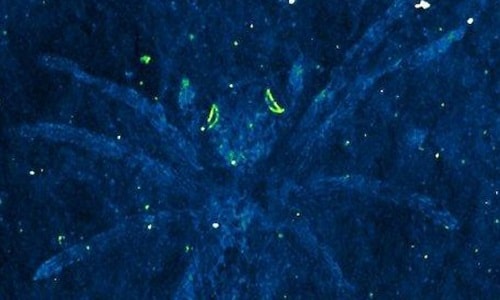Ancient fossil spider has glowing eyes after 110 million years
The eyes of fossil spiders from the Cretaceous period glowed in the dark, helping them improve their vision when hunting prey.
 |
110 million year old spider fossil. |
Paleontologists in South Korea found ancient spider fossils with eyes still glowing after hundreds of millions of years, according toLive Science. Eleven spiders from the Cretaceous period were preserved in shale on the Korean Peninsula. The eyes of two of the spiders emitted a blue light.
The glowing ability of spider eyes is due to a mirror structure in the eye called the tapetum that reflects light from the back of the eye through the retina. Animals use this to improve their night vision, although they may see things a little blurry.
"In spiders, the ones that have really big eyes are jumping spiders, but their eyes are normal, whereas wolf spiders' eyes reflect light at night like a cat's eyes. So nocturnal predators often use this different type of eye. This is the first time a tapetum has been found in a fossil," said study co-author Paul Selden, director of the University of Kansas Museum of Natural History's Institute of Paleontology and Biodiversity.
Selden said the tapetum’s canoe-like shape, dating from 110 to 113 million years ago, helped the team place the spider fossils on the evolutionary tree. Spider fossils are rare, according to the study published on January 28 in the journal Systematic Paleontology. Their bodies are so soft that they usually decompose completely after death, leaving no trace unless they are trapped in amber.
"It must have been a very special situation. The spiders were swept into the water. Normally they float, but here they sank and were not exposed to the bacteria that cause decomposition. It was probably an anaerobic environment," Selden speculated. The rock layer where the spider fossils were found also contained the remains of small crustaceans and fish, suggesting that an algal bloom may have trapped them in the slimy mat, eventually sinking.

